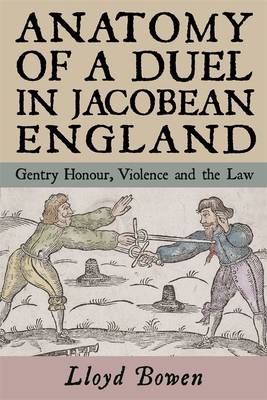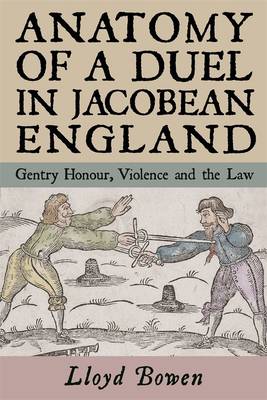
En raison d'une grêve chez bpost, votre commande pourrait être retardée. Vous avez besoin d’un livre rapidement ? Nos magasins vous accueillent à bras ouverts !
- Retrait gratuit dans votre magasin Club
- 7.000.000 titres dans notre catalogue
- Payer en toute sécurité
- Toujours un magasin près de chez vous
En raison de la grêve chez bpost, votre commande pourrait être retardée. Vous avez besoin d’un livre rapidement ? Nos magasins vous accueillent à bras ouverts !
- Retrait gratuit dans votre magasin Club
- 7.000.0000 titres dans notre catalogue
- Payer en toute sécurité
- Toujours un magasin près de chez vous
Anatomy of a Duel in Jacobean England
Gentry Honour, Violence and the Law
Lloyd Bowen
Livre relié | Anglais
177,45 €
+ 354 points
Description
Throws much new light on questions of gentry honour, the nature and prevalence of early modern elite violence, and the process of judicial investigation in Shakespeare's England This book offers an analysis of Jacobean duelling and gentry honour culture through the close examination and contextualisation of the most fully documented duel of the early modern era. This was the fatal encounter between a Flintshire gentleman, Edward Morgan, and his Cheshire antagonist, John Egerton, which took place at Highgate on 21 April 1610. John Egerton was killed, but controversy quickly erupted over whether he had died in a fair fight of honour or had been murdered in a shameful conspiracy. The legal investigation into the killing produced a rich body of evidence which reveals in unparalleled detail not only the dynamics of the fight itself, but also the inner workings of a seventeenth-century metropolitan manhunt, the Middlesex coroner's court, a murder trial at King's Bench, and also the murky webs of aristocratic patronage at the Jacobean Court which ultimately allowed Morgan to secure a pardon. Uniquely, a series of dramatic Star Chamber suits have survived that also allow us to investigate the duel's origins. Their close examination, as Lloyd Bowen shows, calls into question the historiographical paradigm which sees early modern duels as matters of the moment and distinct from, as opposed to connected to, the gentry feud. The book throws much new light on questions of gentry honour, the nature and prevalence of early modern elite violence, and the process of judicial investigation in Shakespeare's England.
Spécifications
Parties prenantes
- Auteur(s) :
- Editeur:
Contenu
- Nombre de pages :
- 239
- Langue:
- Anglais
Caractéristiques
- EAN:
- 9781783276097
- Date de parution :
- 18-06-21
- Format:
- Livre relié
- Format numérique:
- Genaaid
- Dimensions :
- 156 mm x 234 mm
- Poids :
- 526 g

Les avis
Nous publions uniquement les avis qui respectent les conditions requises. Consultez nos conditions pour les avis.






